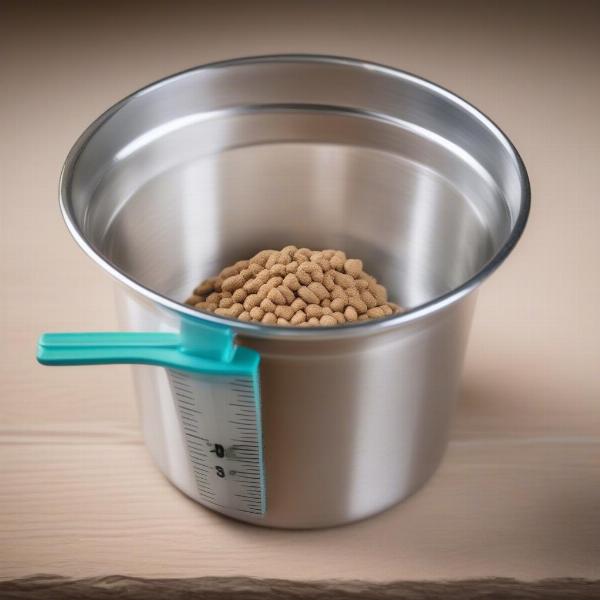Choosing the right dog weight loss food can feel overwhelming. With so many options available, how do you know what’s best for your furry friend? This guide will navigate you through the process, offering practical advice and expert insights on selecting the ideal dog weight loss food for your pet’s specific needs, helping them achieve a healthy weight and improve their overall well-being.
Understanding the Need for Dog Weight Loss Food
Is your dog carrying a little extra weight? Just like humans, obesity in dogs can lead to a host of health problems, including joint pain, diabetes, and heart disease. If your veterinarian has recommended weight loss for your dog, choosing a specialized dog weight loss food is a crucial first step. These foods are formulated with specific ingredients and controlled calorie counts to help your dog shed those extra pounds safely and effectively.
Choosing the Right Dog Weight Loss Food
Not all dog weight loss foods are created equal. Here’s what to look for:
- High Fiber: Fiber helps your dog feel full and satisfied, reducing their tendency to overeat. Look for ingredients like beet pulp, brown rice, and oats.
- Lean Protein: Protein is essential for maintaining muscle mass during weight loss. Chicken, turkey, and fish are excellent sources.
- Controlled Calories: Dog weight loss foods should have a lower calorie density compared to regular dog food.
- Avoid Fillers: Ingredients like corn syrup and artificial flavors add calories without nutritional value.
Transitioning to Dog Weight Loss Food
Switching your dog to a new food abruptly can cause digestive upset. Gradually introduce the new food over several days, mixing increasing amounts with their current food until they are fully transitioned.
How Much Dog Weight Loss Food Should You Feed?
Follow the feeding guidelines on the dog weight loss food packaging, but remember that these are just starting points. Monitor your dog’s weight and adjust the portion size as needed.
 Measuring Dog Weight Loss Food Portion
Measuring Dog Weight Loss Food Portion
Beyond Diet: Exercise and Lifestyle Changes
While dog weight loss food is important, it’s only part of the equation. Regular exercise and a healthy lifestyle are crucial for successful weight management. Incorporate daily walks, playtime, and mental stimulation to help your dog burn calories and stay active.
Expert Insights on Canine Weight Loss
“Remember, weight loss should be gradual and healthy,” says Dr. Emily Carter, DVM. “Rapid weight loss can be harmful to your dog. Always consult with your veterinarian before making significant changes to your dog’s diet or exercise routine.”
“A balanced approach is key,” adds certified dog trainer, Mark Johnson. “Combine a high-quality dog weight loss food with consistent exercise and positive reinforcement to help your dog achieve and maintain a healthy weight.”
Conclusion
Choosing the right dog weight loss food is a significant step towards improving your dog’s health and well-being. By understanding your dog’s needs, selecting a food that meets those needs, and combining it with a healthy lifestyle, you can help your furry friend achieve a healthy weight and enjoy a longer, happier life. Don’t hesitate to consult with your veterinarian for personalized advice and guidance.
FAQ
- How quickly should my dog lose weight? A safe and healthy rate of weight loss is 1-2% of their body weight per week.
- What if my dog doesn’t like the new food? Try different flavors or textures of dog weight loss food. You can also mix in a small amount of wet food or low-calorie treats to enhance palatability.
- Can I give my dog treats while they are on a weight loss diet? Yes, but choose low-calorie treats and factor them into your dog’s daily calorie intake.
- How do I know if my dog is at a healthy weight? Your veterinarian can assess your dog’s body condition score and recommend an ideal weight range.
- What are some signs of obesity in dogs? Difficulty breathing, reluctance to exercise, and excess fat around the ribs and belly are common signs of obesity.
- Is it okay to switch dog weight loss food brands? Yes, but do so gradually to avoid digestive upset.
- Can puppies eat dog weight loss food? No, puppies have different nutritional needs and should eat puppy food formulated for their growth and development.
Related Articles
ILM Dog is a leading online resource for dog owners worldwide. We provide expert advice and practical tips on all aspects of dog care, from choosing the right breed to ensuring a healthy and fulfilling life for your canine companion. Our areas of expertise include breed selection, health and medical care, training and behavior, nutrition and feeding, grooming, exercise, puppy care, senior dog care, and travel with dogs. For expert advice tailored to your individual needs, contact us today! Email: [email protected], Phone: +44 20-3965-8624. Visit ILM Dog for more information.